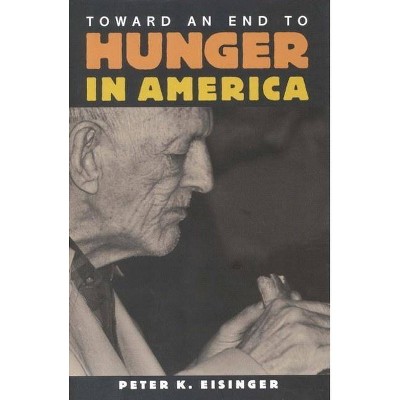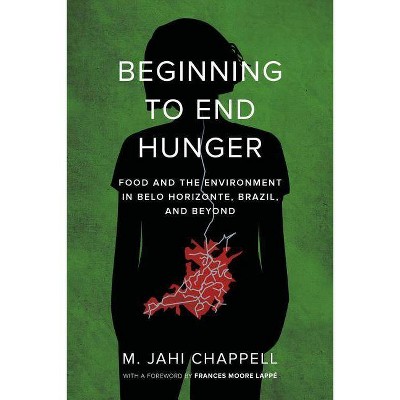Toward an End to Hunger in America - by Peter K Eisinger (Paperback)

Similar Products
Products of same category from the store
AllProduct info
<p/><br></br><p><b> About the Book </b></p></br></br><p>Cheap, plentiful food is an American tradition. We spend a smaller percentage of our income on food than any other nation. We feed much of the world with our surpluses. Consumers, retailers, and restaurants throw away one-quarter of our food stock every year. And yet data collected by the federal government show that almost 12 percent of American households either suffer from hunger or worry about going hungry.</p> <p>Why are so many Americans afflicted with food insecurity during such prosperous times? According to this book, it's not simply an artifact of poverty: even most of the poorest homes have access to adequate food. Nor is it indifference to their plight or a lack of ways to help: Americans strongly support government food assistance, and there are a host of public and private programs devoted to feeding the hungry.</p> <p>Peter Eisinger seeks to unravel the puzzle of America's hunger and asserts that it is a problem that can be solved. He believes that the perception of hunger and responses to it emerge from a complex, intellectual, political, and social context. He begins by looking for a meaningful definition of hunger, then examines the structure and funding of government food assistance programs, the roles of Congress and community interest groups, and the contributions of volunteer organizations. He concludes by offering ideas to reduce the nation's perplexing hunger problem, based on creating stronger partnerships between public and private food programs.</p><p/><br></br><p><b> Book Synopsis </b></p></br></br><p>The historic European Union Directive on Data Protection takes effect in October 1998. A key provision prohibits transfer of personal information from Europe to other countries if the European Commission decides that they lack "adequate" protection of privacy. If enforced as written, the Directive could significantly disrupt commerce between Europe and other countries, such as the United States, that do not have comprehensive privacy statutes. In this book, Peter Swire and Robert Litan analyze the tension between privacy laws, which restrict data flows, and modern information technologies, which encourage them. Based on study of actual data flows between Europe and the United States, the book provides the first detailed analysis of the potential sector-by-sector effects of the Directive. This analysis reveals significant problems under the Directive for financial services, human resources records, corporate intranets, and many other essential aspects of modern economies. The book offers policy recommendations for helping to avoid a possible trade war with Europe. This book will be of interest to the many individuals and organizations affected by the new European privacy laws and by proposed new privacy laws in the United States.</p><p/><br></br><p><b> Review Quotes </b></p></br></br><br><P>."..provides the most comprehensive treatment of evolving governmental and nongovernmental food assistance programs to date." --Maurice MacDonald, Iowa State University<br><br><P>."..Eisinger's political history of a variety of hunger programs and his characterization of U.S. government food assistance [were] very useful. " --Seth Osborne DaPonte, University of Pittsburgh, Pennsylvannia, "Annals of the American Academy of Political & Social Science", 7/1/2000<br><br><P>"In an invitingly short and clearly laid-out book... [Peter Eisinger] provides a cogent analysis of twentieth century U.S. food policy and programming, and the results." --Laura Lein, University of Texas, Austin, "Contemporary Sociology", 5/1/2000<br><p/><br></br><p><b> About the Author </b></p></br></br><p> <b>Peter K. Eisinger </b>is a professor in the College of Urban, Labor, and Metropolitan Affairs and director of the State Policy Center at Wayne State University. He was formerly on the faculty at the University of Wisconsin-Madison, where he was director of the La Follette Institute of Public Affairs.</p>
Price History
Price Archive shows prices from various stores, lets you see history and find the cheapest. There is no actual sale on the website. For all support, inquiry and suggestion messagescommunication@pricearchive.us




















